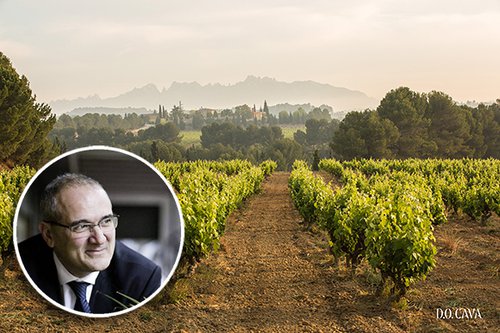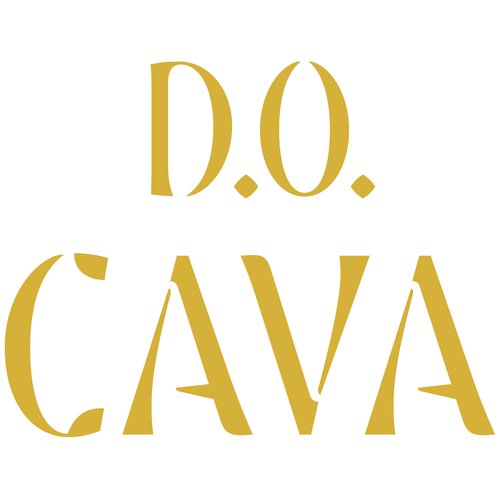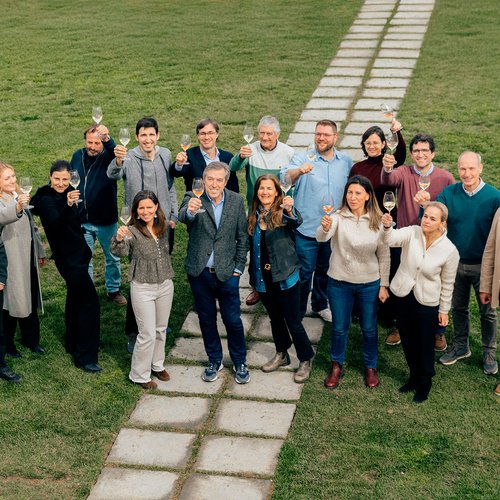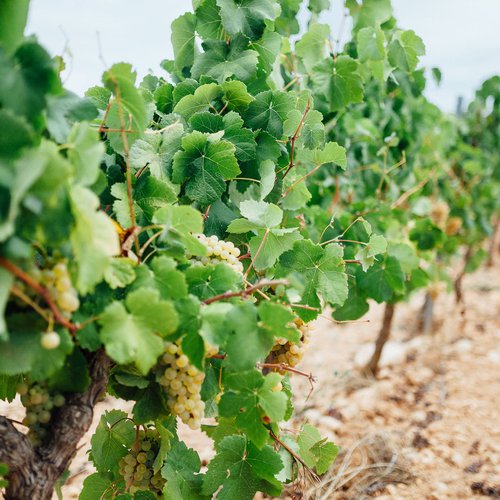The guarantee of the Denomination of Origin seal: adding value to wines that are consumed all around the world
Products with Designation of Origin are produced under unique climatic conditions, in a traditional way, and maintaining the highest quality standards. This affords them a distinction that is transmitted to the consumer through the Designation of Origin seal.

Communicating products’ distinctive values; offering legal protection against other products produced in different areas; and greater recognition in national and international markets: these are some of the main reasons for the existence of official Designations of Origin.
The D.O. is especially relevant for products sold around the world such as Cava: with more than 70% of international sales, it is one of the Spanish D.O.s that exports the most. Furthermore, D.O. Cava’s commitment to driving forward new quality and zoning regulations is focused on raising consumers’ awareness of the origin and quality of Cava. In order to better understand the value of the Denomination of Origin seal in the current context, we spoke to Pedro Ballesteros, Master of Wine, agronomist, and Master in Viticulture and Oenology from the Polytechnic University of Madrid.
What is Spain’s current position within the international wine sector?
PB: We are a strong competitor. We have the highest production value in history, with many excellent companies and increasingly skilled people who work in the industry. Of course, there is much that we still need to do, and to improve, but we should not underestimate our position.
In Spain we continue to sell a lot of wine, but the price often does not match the quality. Do you think it is because we do not know how to sell ourselves?
PB: We tend to use this excuse that we don't know how to sell. I think we do know how to sell - just look at the international success of Cava. Some people say that the Italians have worse wine, but they are much better at selling it; I don't agree with this. Certainly restoring the vineyard’s importance is key for managing the land, and for promoting policies of generational shift in the countryside.
Despite the economic difficulties in 2021, D.O. Cava sales grew by 17.34%. What do you think this success is due to?
PB: All sparkling wines sales have increased, and one possible reason is that we have come out of the pandemic with the desire to celebrate: bubbles are associated with things going well. We also need to take into account the rise in value and the qualitative improvements that are being made.
All efforts aimed at sustainability are positive, but from my point of view they need to be intrinsic to the Cava industry: they are our obligation, as a society, to the rest of the planet.
I believe that this movement has made the Cava sector wake up and move out of its comfort zone, forcing it to suggest other alternatives focused on quality distinction.
Not all sparkling wines produced in the territories where Cava can be made are protected by Designation of Origin. What do you think is the main difference between the two types of wine?
PB: The Designation of Origin offers certain quality guarantees because it requires producers to meet specific vine-growing and winemaking conditions. Those who work in the wineries day in, day out need these guarantees to open up markets, as not every producer has the time to devote to creating a brand. Moreover, wine is an agricultural product that must have a connection to its territory. You also have to give credit to [the dedication of] previous generations [who established high standards], to a country that is flourishing, to open markets, and so on. Many elements exert an influence.
What do you think international consumers perceive when they see a Denomination of Origin label?
PB: In most cases they don't understand it, because there are many Designations of Origin and consumers don't have much time to choose when it comes to buying. However a D.O. like Cava is more likely to be recognised and identified by the consumer.
The main responsibility of the Designation of Origin is to create another image of Cava, a re-evaluation. We have to bear in mind that consumers are changing [their perception of high-quality wines], but very slowly.
How do Designations of Origin support diversity within their sector?
PB: A D.O. is a guarantor of certain production conditions. Of course, there must be diversity [in terms of types of business and strategies], but above all, the designation provides a guarantee with precise definitions.
Within these “rules of the game”, diversity must be respected, thanks to familiarity with the production process, and to the options of what can be produced within established limitations.
What are the pillars on which a Designation of Origin is based?
PB: The main function is to protect prestigious wines. But we must bear in mind that, while all Designations of Origin exist within the same legal framework, not all of them have the same raison d'être.
Some were created to protect an already earned prestige, and to try to prevent third parties from taking advantage of their name. Cava had to be created almost by obligation to protect a method of production, the traditional method, and increasing numbers of specifications have since been added.
Cava is the only Spanish wine that is present in almost every country in the world. How do you think the D.O. seal has contributed to this success?
PB: Now that Cava de Guarda is exported with great success, we have to promote the higher quality wines to consumers, so that they are willing to pay higher prices, since the D.O. provides them with guarantees and identification. This will be achieved by increasing the consumer's perception of quality and prestige, thanks also to the work of the Cava Designation of Origin label.
Cava is still consumed mostly as a pleasant and accessible wine, but now it must also be perceived as a quality product, associated with new zones and sub-zones with specific names. We need to send a clear message to consumers, and to achieve this, we need a high level of cooperation from the producers.
In your opinion, what is the greatest challenge facing Cava today?
PB: Everything will depend on how this surge in quality is managed by the Designation of Origin, on the quality of the wines, and on the cooperation of the different agents in charge of managing the territory.
The challenge of differentiating our wines and unique areas was solved by dividing the territory into zones and sub-zones. What do you think of these measures?
PB: They are a winning bet for promoting Cava as a product of increasingly higher quality, through the attributes offered by the new zones and sub-zones.
Among other things, they allow the consumer's perception of our wines’ quality and prestige to continue improving.
Moreover, valuing the territory more highly is always a good thing.
New categories have been created, such as the Cava de Paraje Calificado. What do you think they bring to the consumer?
PB: For the consumer, it is important that wine has specific terminology, especially if they correspond to a higher perceived quality. Cava de Paraje Calificado accomplishes such an objective; it is an initiative that I have supported from the beginning.
In your experience, do you think consumers are willing to pay more for a Denomination of Origin product?
PB: Yes, I do think so; the consumer has historically been aware of the difference between what was known as "vino de pasto", or table wine, and fine wine. Anonymous wine is cheap, while fine wine has specific terminology, which can sometimes be the brand name. But considering that the wine sector is very heterogeneous, and that we have many small companies, the name tends to be a seal that offers some guarantee. It can refer to the wine’s origin or to ideological positions, such as a green seal or other quality seals.
In recent years the number of premium Cavas available on the market has increased notably. Why do you think this is?
PB: It is due to many different factors, but I would highlight three above all. The first is that we now have well-trained winemakers who aspire to create this type of product. Also, there is a receptive market for such a Cava. And finally, there is no longer a feeling of inferiority with respect to Champagne.
Our country could have been considered third-world until relatively recently. By opening up to new markets, we have nurtured the capacity for creation, and encouraged more qualified people. There has been a generational change in illustrious wineries, from a base that has allowed the next cohort of winemakers to create Cavas which aspire to fulfil the true potential of this product.
How do you see the future of Cava in the coming years; in what direction do you think consumer preferences are going to evolve?
PB: The truth is that with the current situation and so much uncertainty, it is very difficult to predict. Anything could happen. In general, I would say that the most premium Cavas are going to do better and better, precisely because the rich are getting richer and richer. On the other hand, the more basic Cavas may have a harder time because the shrinking middle class has increasingly few reasons to celebrate.
However we should bear in mind that Cava has faced challenging times throughout its history and has always survived, because it continues to hold a wide appeal that arouses passions.
Wine is only wine because someone drinks it: Cava has always found its market, responding to customer demand and social movements.
Why do you think Cava continues to be so successful?
PB: Because it has a very powerful cultural component. What differentiates wine from spirits or beer is that those who drink wine have to do some preparation in order to understand it. Enjoying wine with a name requires a greater cultural effort.
Should we be concerned that, in recent years, the wine and beverage sector has seen a steady decline in consumption?
PB: I think it's great that the consumption of wine without names is going down, because what interests me is that the value of wine consumption increases, that there are more and more people who enjoy talking and thinking about wine. But that we talk about wines with designations, that bring us joy.
The key is to drink less, but to drink better, with an awareness of what we are drinking, and an appreciation. Wine should not be trivialised, and I am not interested in promoting wine drinking in general.
What message would you like to leave for the Cava sector?
PB: That the producers continue to be creative, which they already are, avoiding the temptation to use price-focused promotions. That they continue to move forward with the conversations that are already taking place and with the definitions of quality, because this is going to have an impact on the territory, with the result that we are all going to live much happier lives.





